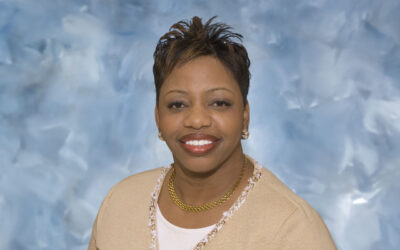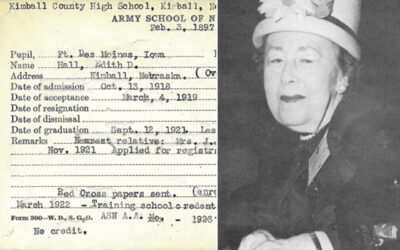The Good Nurse: Childhood experience inspires Ileana Breaux to make a positive impact on patients
By Matt Skoufalos
Nurses choose the profession for various reasons. To some, it’s a calling; to others, the pursuit of a family tradition.
There are those, however, who can trace their careers to a single defining moment in their lives, and Operating Room Supervisor Ileana Breaux, RN, is one of them.
“It was Easter and I was wearing a dress,” she recalls. “I slipped because it had been raining.”
Not wanting to get her dress wet, Breaux grabbed for a nearby fence to brace her fall — and sliced her arm open on barbed wires. Instinctively, she covered her arm with her hand and told her mother, “I think you need to take me to the doctor.”
As the pediatrician worked to stitch her up, however, it wasn’t a smooth process.

“Either the stitches weren’t deep enough or the anesthetic didn’t work, but I felt everything,” Breaux said. “I was screaming and crying, and the nurse told me, ‘Shut up and be brave.’ ”
She was 12.
Brought up in a tradition where children weren’t allowed to raise their voices to adults, Breaux stifled her objections. A week later, when she returned to the office to have the sutures removed, she summoned up the bravery the nurse had requested.
“I walked up to her and I said, ‘Someday I’m going to grow up and be a nurse, and I’m not going to be a mean witch like you!’” Breaux said.
“When I got into the car, my mom’s eyes welled up, and she said to me, ‘Thank you for saying what I couldn’t.’ ”
“That was my intro to being a nurse,” Breaux said. “I wasn’t going to add insult to injury.”
Good to her word, Breaux began her professional training at Miami-Dade, finished school at the University of Florida, and spent almost nine years working as a pediatric nurse at Miami Children’s Hospital. At its outset, the program took her through three different units in three months to get her exposed to the various aspects of the job. Breaux worked in an endoscopy lab, treating children with reduced appetites; worked in recovery, caring for children who’d had tonsillectomies, and generally marveled at their strength and resilience.

“Then I had my own kids and things hit a little closer to home,” she said. “I would sit in the car after work and start bawling. ‘Why does this 18-month-old have leukemia?’ ”
Then, Breaux found an opportunity with Drs. Michael Kelly and Carlos Wolf of Miami Plastic Surgery in Miami, Fla. Beginning as a staff relief nurse, she joined the practice full-time when a second nursing position opened up. Nine years later, she is still with the same facility.
“I love it,” Breaux said. “It’s a different type of rewarding, but it’s exactly what I wanted to do.”
Breaux said the most rewarding part of her job is noticing the difference in the way patients will carry themselves before and after a procedure. Those who make alterations to their facial features will go from being timid and shy to confident and direct, she said. Even those who are there for the most common procedures performed at the facility, liposuction and breast augmentation, inspire her with their personal transformations.
“I think it reinforces why I’m here,” Breaux said.
She also described feeling much more confident of her own professional abilities in the scaled-back demands of the cosmetic surgery clinic. In a hospital setting, Breaux described feeling like her “hands were tied a lot” by the demands of caring for greater numbers of increasingly sicker patients.
“You’re not equipped with enough resources to do what you should be able to do,” she said. “If they give you 10 very, very sick patients, you have to split up and prioritize. You rely on your nurse’s assistants, and it opens up the possibilities for things to happen.”

Breaux is also critical of insurance companies that try to rush patients out of the hospital too quickly. Although she realizes that the cost of a hospital stay is expensive, “if you’re a little more proactive than reactive, a lot of things don’t recur,” she said.
Still, Breaux said she loves the profession that has given her so much, and hopes to continue her work for as long as her body can withstand the physical demands of 10- to 12-hour days.
“A lot of people don’t realize that when you have surgery that goes on for seven hours, you’re in there for that amount of time,” she said. “As long as I can do it, I’ll be doing it.”
When Breaux does retire from full-time practice, she said, her “bucket list” includes mission work. It’s something she’s wanted to pursue, but has held off since starting a family. After 11 years of marriage, Breaux has gone from being an avid CrossFit practitioner to a softball mom who drives seven-year-old Sarah and nine-year-old Lauren to practices and games — but she doesn’t regret a moment of it.
Her older daughter “loves medicine,” and “likes to see videos and know what’s going on, and for me to tell her stuff.” The younger “won’t say ‘blood’ because she’s so creeped out by it.” But if neither follows in her mother’s footsteps, Ileana Breaux won’t be upset.
“Nursing on the whole, it’s just like any profession,” she said: “get into it because you enjoy it. The reality is that you spend more time at your place of employment than you do at home sometimes. Go in to it because you want to make a difference and you want to help.”
Of course, given the way she discovered the profession, Breaux likely wouldn’t criticize someone for finding their career path out of spite. But she recognizes it’s not an ideal motivator.
“Do it because you want to make a difference, not just because you’re going through the motions,” Breaux said. “Ultimately, the person who pays the price for that is the patient, because they’re the most vulnerable. Do it because you want to do it, not because it’s something that you have to do.”










